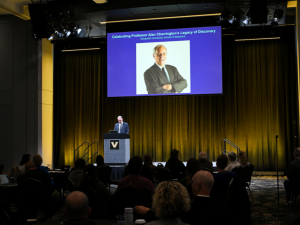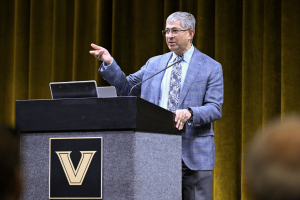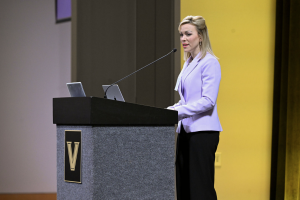 On March 17, Vanderbilt faculty, trainees, students, and leading experts in diabetes and metabolism gathered at the Student Life Center for a day-long symposium to pay tribute to Alan Cherrington, whose monumental contributions to diabetes research and metabolic regulation have fundamentally changed therapeutic strategies for diabetes management. The event also featured presentations on groundbreaking research from distinguished speakers representing top universities across the country.
On March 17, Vanderbilt faculty, trainees, students, and leading experts in diabetes and metabolism gathered at the Student Life Center for a day-long symposium to pay tribute to Alan Cherrington, whose monumental contributions to diabetes research and metabolic regulation have fundamentally changed therapeutic strategies for diabetes management. The event also featured presentations on groundbreaking research from distinguished speakers representing top universities across the country.
“For nearly five decades, Alan has been at the forefront of metabolic research, pioneering studies that have transformed how we approach diabetes treatment,” said John Kuriyan, dean of the School of Medicine Basic Sciences, in his opening remarks. Cherrington discovered glucagon as a key regulator of hepatic glucose production, which revolutionized therapeutic strategies for diabetes management.

Cherrington’s impact on diabetes research has been profound, but his influence extends beyond scientific discoveries. He is a professor of molecular physiology and biophysics and has mentored over 50 graduate students and postdoctoral fellows throughout his career. He previously served as chair of his department for nearly a decade and as associate director of the Diabetes Research and Training Center for over 30 years.
“He has been instrumental in shaping our institution’s research landscape,” Kuriyan said.

Many of the distinguished researchers who have been influenced by Cherrington’s work traveled to Vanderbilt to present their own research at the event, which was spearheaded in large part by Katie Coate, an assistant professor in the molecular physiology and biophysics department. Gerald I. Shulman from Yale University opened the scientific sessions with insights into metabolic regulation. Erica Nishimura from Novo Nordisk A/S followed with advancements in diabetes and obesity research. Christopher Newgard of Duke University and Domenico Accili from Columbia University continued the momentum with cutting-edge findings on nutrition and metabolic disorders.
The poster session midday provided emerging researchers, students, and trainees an opportunity to showcase their work and engage with leaders in the field. Afternoon sessions included a talk by Amy Hess Fischl of the University of Chicago Kovler Diabetes Center, who shared practical perspectives on diabetes education and patient care. Philipp Scherer from UT Southwestern Medical Center concluded the scientific talks with his research on adipose tissue and metabolism.
Throughout the day, Cherrington’s enduring influence was evident, particularly during the reception that followed the event, where attendees shared personal anecdotes and reflections on his remarkable career.
Kuriyan summarized the sentiment of the day: “Dr. Cherrington, on behalf of Vanderbilt University—thank you. Your contributions will continue to shape the field of metabolic research for generations to come, and we are truly grateful for the lasting impact you have made.”